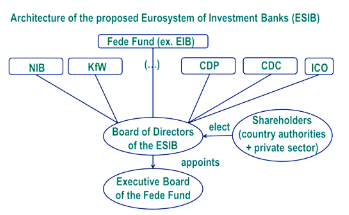A New Architecture for Public Investment in Europe
Natacha Valla
Thomas Brand
Sébastien Doisy
Natacha Valla
Thomas Brand
Sébastien Doisy
 Some five years after the severe recession of 2009, private sector investment in Europe is still dangerously sluggish. And public sector investment has been cut, reinforcing the downward trend seen over the past thirty years.
Some five years after the severe recession of 2009, private sector investment in Europe is still dangerously sluggish. And public sector investment has been cut, reinforcing the downward trend seen over the past thirty years.In this paper, we discuss the complementarity between private and public sector investment. Evidence suggests that in the medium term, public investment does not hinder, but fosters, the quantity and efficiency of private investment. Moreover, our fiscal multiplier for public investment (at 1.4, considerably above ‘breakeven’) is significantly stronger than those for other fiscal instruments. Taken together, these two findings suggest that the public sphere would be well advised to tilt spending towards investment in areas such as infrastructure and human capital, which represent an investment for future generations.
A new European initiative might be needed to get investment back on track and thus protect future growth. To this end we propose establishing, by treaty, a Eurosystem of Investment Banks (ESIB), around a pan-European financial capacity that would coordinate the actions of the national public investment banks of Euro area member states and add to their funding capacity. The ESIB would channel the Euro area’s excess savings towards investment in the right places throughout the continent. To do so in an economically sustainable and financially profitable way, funding would be conditional on firm commitments to growth-enhancing structural reforms and economic policies.
Our proposed Eurosystem of Investment Banks (ESIB) would be structured around a federal centre and national entities. The central node, the Fede Fund, would be created by restructuring the European Investment Bank into a truly federal entity. The Fede Fund would orchestrate the joint work of national investment and development banks with a clear European map in mind.
The mandate of the ESIB, enshrined in the Treaty, would be to promote long-term growth, well-being and employment in Europe. The mandate would, by definition, reflect a political consensus emanating democratically from the people of the Euro area member states.
The ownership and governance of the Fede Fund would be key in ring-fencing the investment process from national political agendas not linked to the promotion of long-term growth. We propose a structure with both public and private Fede shareholders, who would collectively elect the ESIB Board of Directors. The Fede Fund would also issue debt to finance investment at an economically relevant scale (10% of Euro area GDP, so around €1tn).
Retour





